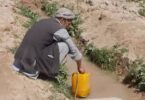Monitoring Desk
KABUL: Documents seen by TOLOnews show that there are ambiguities around in fuel testing contract awarded to an Indian company by the National Procurement Authority (NPA).
The documents reveal that the UAE-based Indian company, Therapeutics Chemical Research Corporation (TCRC), participated in a bidding process to secure the project through its business branch in Afghanistan. However, President Ashraf Ghani after being informed, directed the relevant departments to prevent participation of TCRC in the bidding process for the contract.
Other similar documents show that the Indian company later was given a year time to complete the required criteria for securing the contract. The fuel quality testing project was on tender in 2018.
According to Afghanistan’s National Standards Authority (ANSA) which represented the government in the bidding process, the TCRC was not eligible to participate in the process.
The documents also show that ANSA was not satisfied with the background of four companies in the bidding process, including TCRC.
But in January 2019, the National Procurement Authority decided to award the contract to TCRC in order to have 27% benefits pledged by the company, which encompassed the inclusion of between $50,000 to $90,000 daily to the governemnt revenue, the documents show.
“After an assessment, our technical team recommended various companies eligible (for the bidding) but the National Procurement Authority announced the TSRC company as the winner after it started handling the matter,” the deputy head of the ANSA Jawed Seddiqi said.
Documents also reveal that TCRC managed to participate in the bidding process of the project through its business branch in UAE but the Ministry of Commerce and Industries came to know it several days after it issued license to the company.
“Because there was no enough time for bidding, so we managed to participate in the bidding process through our (Business branch), because we needed to complete our bank accounts and other issues. The owner of the two is one, because, the (business branch) operate in Dubai. Later on, from Bombay, the (Power of attorney) which we had brought from Dubai, it came from India too,” said Abdul Saboor Kamran, advisor to TCRC.
“Meanwhile, we were given an offer in the form of an email for an investigation. Then we sent a letter to the Indian embassy and we are still waiting to get an answer,” Sediqqi said.
According to the documents, when the government rejected the participation of TCRC in the bidding process, the company used its business branch in Dubai to secure the contract.
On November 2019, President Ghani ordered the deputy secretariat of plans and governance of the Presidential Palace to prevent the participation of TCRC in the bidding process, the documents reveal. Ghani also ordered relevant organizations to take legal actions if TCRC created any problem in the process and refer its official to the Attorney General.
The documents also state that following Ghani’s directive, the ANSA suspended the contract with TCRC. But, on December 2, 2020, the NPA once again included participation of TCRC in the bidding process and one week later, NPA signed the contract with TCRC to secure project.
“This contract needs to be signed in the presence of representative of the Indian embassy in Kabul and chairman or an authorized representative of this body. Alongside that, this contractor may not be allowed to refer this project to a second contractor. So far from the investigations, the ANSA has not reported back to the National Procurement Authority,” said Ramin Ayaz, head of the Strategic Communication Department of NPA.
“There are logistical issues here. Go and ask the National Procurement Authority, ask the ANSA. If there are problems in our license, then go and ask the ministry of commerce and industries and ask them why they have issued license to these people,” said Abdul Saboor Kamran, a senior advisor to TCRC.
The documents show that there was no coordination between the institutions involved in the process. (TOLOnews)






